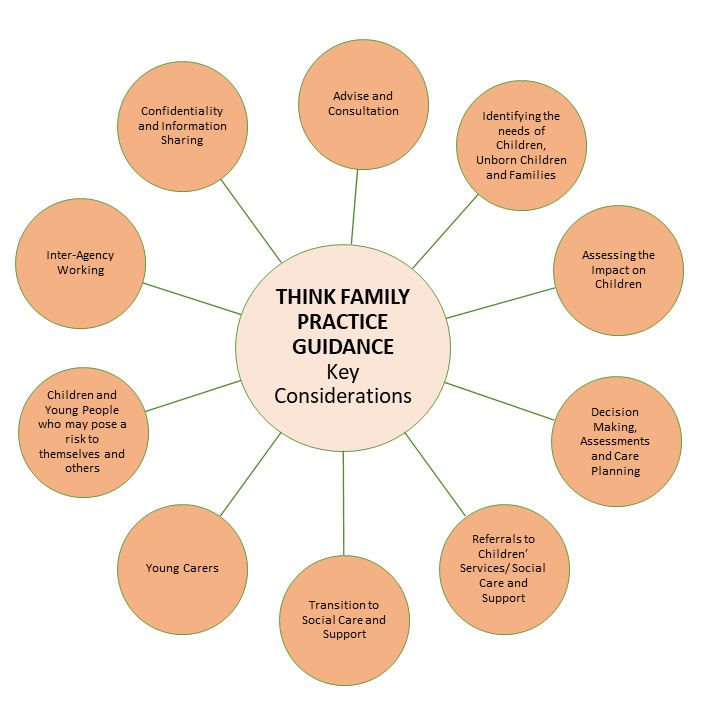WARWICKSHIRE THINK FAMILY
Protocol and Practice Guidance
Everyone has a responsibility to take a ‘Think Family’ approach in the context of safeguarding children and adults. Warwickshire Safeguarding recognise this to be a shared responsibility which must be at the heart of practice across all partner agencies within the Partnership. The Warwickshire Think Family Protocol is a commitment from Warwickshire Safeguarding which promotes a ‘Think Family’ approach by all partner agencies.
Practice Guidance
The following practice guidance is for practitioners and managers working with children or adults at risk of abuse or neglect. It supplements the Warwickshire Think Family Protocol.
The guidance will help you to:
- Make sure you consider for the needs of the family for each of the headings in the diagram below; and
- Record and share relevant information, to understand its significance and take appropriate action.

Click on each sub-heading below to see key questions to help you support a child, young person and/or adult within a family. Think about the impact of your answer and the risk of doing nothing.
- Do you understand the relationships within the family especially where parents, carers and relevant ex-partners are involved with services?
- Have you checked whether there is relevant historical evidence of previous contact with drug and alcohol/ mental health/ forensic services and police/ Youth Offending Team/ Probation services for parents/carers/partners and ex-partners?
- Are professional boundaries flexible so children do not fall between services and are not left at risk?
- Have you recorded relevant information in writing, e.g. when clarifying concerns by telephone between service areas?
- When working with an adult service user, have you considered the impact of any caring responsibilities on the child or young person within the family?
- Have you identified all the agency safeguarding leads for the children/adults within each of the organisations known to be involved in the case?
- Have you gained the informed consent of any adults you would like to refer to another agency? Have you gained the informed consent of parents before sharing information about them and their child, or unborn child, for early help or targeted services?
(Consent should be in writing where the information is particularly sensitive, for example, about the mental health of the adult. Verbal consent should be recorded in case notes. Adults, and children who are old enough, must understand why this information is needed and who it will be shared with). - Have you discussed your concerns about children or unborn children with their parents, where safe to do so, to inform them you are planning to make a referral to MASH?
(Professionals are expected to inform parents they are making a referral to the MASH unless such discussions will place the child at increased risk of significant harm or cause further significant harm. Where the decision is made not to inform parents about a referral, the reason for this should be recorded on the child’s file). - Have you ensured that information disclosed without consent is relevant and only disclosed to those professionals that need to know? Have the reasons for disclosure been clearly recorded and consideration been given to the proportionality of disclosure against non-disclosure?
- Have you referred to the WSCB procedures on ‘Information Sharing’ when dealing with a child protection case?
- Have you liaised with professionals in Primary Care i.e. GPs and Health Visitors to seek general advice and consultation?
- Have you sought advice from supervisors and team managers in children and adult social care?
- Have you sought advice from experienced colleagues in your team or organisation?
- Have you obtained advice from the Children’s Duty and Assessment team or from the allocated worker?
- Have you consulted with the paediatrician, who is the designated doctor for child protection, if appropriate?
- Have you contacted the relevant Consultant Psychiatrist for advice on those cases raising the greatest level of concern due to mental health/learning disabilities; and have you recorded this advice as part of the case file?
- Have you sought advice from your domestic violence lead, in cases related to domestic violence?
- Do you work with the family, building on the strengths of family members and providing support to meet their needs?
- Have you asked agencies whether any of the adults within the family setting have issues that potentially put children at greater risk? e.g. a parent/carer with a history of domestic violence/other known violence; has psychosis; misuses substances – drugs or alcohol, etc.
- Have you considered the adults in these families may themselves be adults in need of safeguarding?
- Have you considered the needs of disabled children and their families?
(There may be increased risks to disabled children where there is domestic violence and some disabled children may be violent toward parents/carers).
- Have you considered the impact of any difficulties the parents/carers or pregnant women may have on their ability to meet the needs of their children or unborn child, i.e. a mental illness, a drug and alcohol problem, a learning disability or adults who are victims or perpetrators of domestic violence?
- Have you considered the impact of the parents or carer’s illness / disability / situation on their ability to meet the development and safety needs of their children and/or unborn child?
- Have you considered the impact of family functioning, family history, the wider family and environment factors on the parents’/carers’ capacity to respond to the children’s/unborn child’s development and safety needs?
- Do you know which other agencies are involved and understand their role(s)?
- Have you discussed the need for additional support or making a referral to another organisation with the parents, carer or pregnant woman’s consent?
- Do you have any concerns about the children’s/unborn child’s well-being or safety; is action required to safeguard and promote their welfare?
- Has a lead professional been identified to undertake an Early Help Assessment (when it is appropriate) and information shared to avoid duplication of assessments?
- Are you working well with other practitioners ensuring that multi-disciplinary assessments, reviews and care plans are considered, shared and recorded on the individuals file?
- Have you involved all relevant professionals from other teams, including any specialist workers, for example, psychiatrists, psychologists and family centre workers in the assessment of your case?
- Have you considered the longer term needs and capabilities of the family when considering eligibility for services, rather than the existence or absence of incidents?
- Is the purpose of a referral to another team clear?
- Have you discussed the referral with your manager?
- Have you contacted the police where there is immediate danger to the child or others including a parent/carer?
- Have you fully and accurately documented your decisions and agreed course of actions, ensuring they are signed and dated?
There are a number of different transition processes for young people approaching adulthood i.e. transitioning into Mental Health, Social Care or into Leaving Care Services.
- Have you ensured a formal handover of protection plan arrangements in a timely manner so that adult services can plan provision?
- Have you agreed who is responsible for the completion of mental capacity assessments?
- Have you considered any ongoing safeguarding issues in the final conference where a young person has a current Child Protection Plan?
- In relation to Young People who will be transitioning with Care & Support needs have you made a safeguarding adult referral in a timely manner where concerns exist, but a young person does not have a current Child Protection Plan?
- Have you prepared the young person for the transition and helped them overcome any potential barriers, explained the new arrangements such as booking appointments and informed them of any new expectations under Adult Social Care?
- Have you ensured there is an effective transfer of good quality information about the young person?
- Have you considered planning a 3 way meeting between the young person, the present provider and the adult service provider to make introductions, share and discuss relevant information to assist the young person?
- If an adult’s or carer’s assessment has identified that a child is involved in providing care, have you considered:
1. The impact of the person’s needs on the young carer’s wellbeing, welfare, education and development; and
2. Whether any of the caring responsibilities undertaken by the young carer are inappropriate? - Is the child’s school involved or aware of what is happening? Do they or could they offer sensitive support? Discuss this with the young carer and their family.
- Encourage your client to explain their health condition to their child (or allow you to do it) Explain that lack of knowledge may be more damaging to the child than age appropriate information.
- Contact Children’s Social Care for advice. Remember that some young carers and their families are reluctant to admit their role and fearful of seeking help but they would value sensitive support.
- Have you ensured that the relevant Adult Services are aware where a young person’s behaviour raises concern of risk to others, e.g. through the transition process?

















